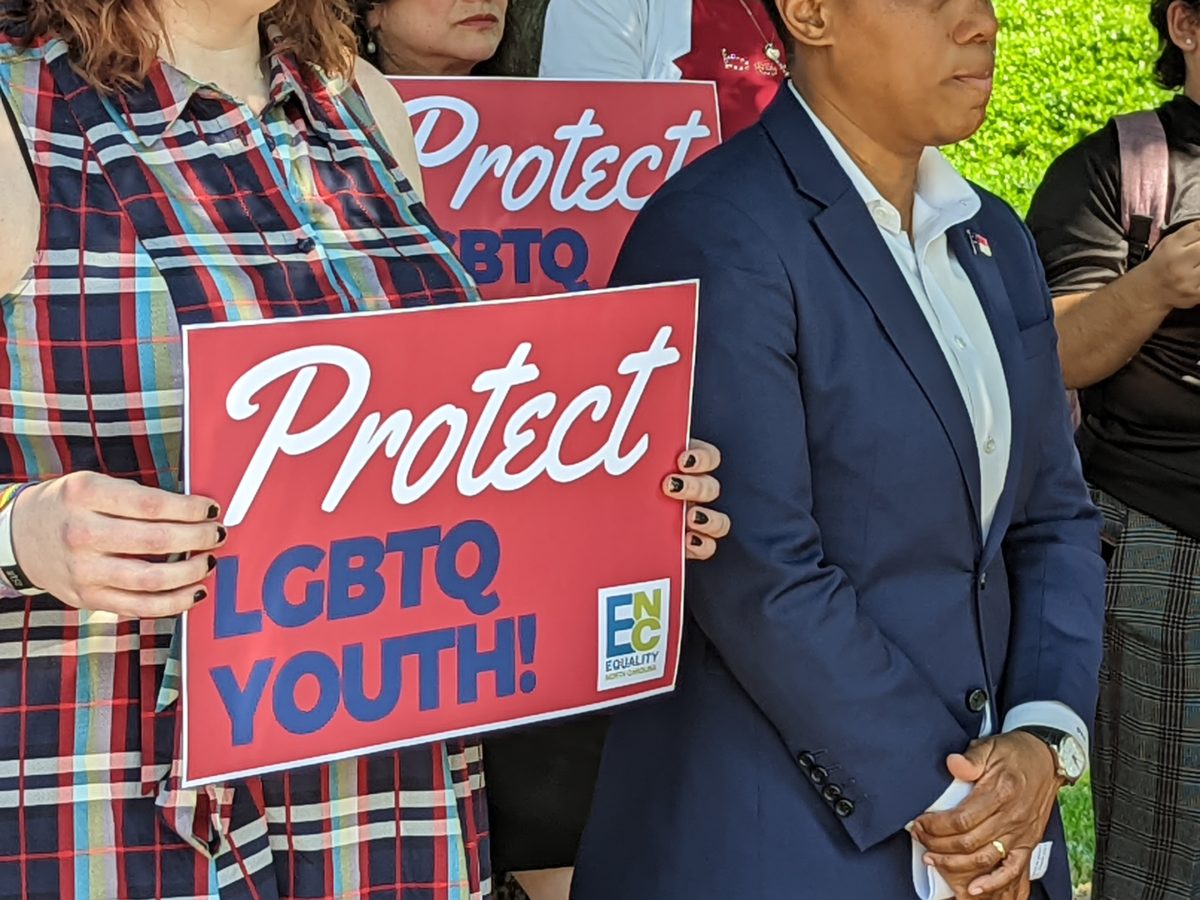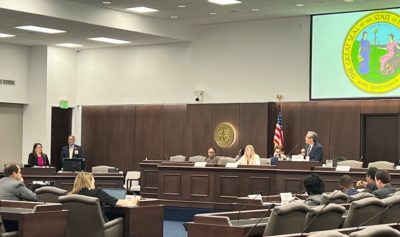

Share this story
On Wednesday, June 1, the first day of Pride Month, the North Carolina Senate passed a bill that would ban teaching about gender identity and sexuality in K-3 classrooms.
The legislation, titled the “Parents’ Bill of Rights,” was introduced in the Senate last week and passed Wednesday by a 28-18 vote along party lines. The bill has three main provisions:
- It outlines several rights that parents would have if their child is in public schools. These include access to education records and communications, but also the rights to “direct the upbringing and moral or religious training of his or her child” and to “make health care decisions” for the child.
- A provision related to the teaching of LGBTQ+ issues states that “instruction on sexual orientation or gender identity shall not be included in the curriculum provided in grades kindergarten through third grade.”
- The bill would require schools to make policies to promote parental involvement. This includes such things as requiring principals to communicate to parents about textbooks, allowing parents to review materials used in class, and establishing a process for parents to object to those materials. (A version of this provision was included in a bill that failed during last year’s long session.)
The bill now heads back to the House for a concurrence vote. If the House approves the bill, it will go to the governor.
Republican leaders in the Senate have repeated that this bill is meant to address the concerns and needs of parents. Senate President Pro Tempore Phil Berger put out a news release defending the bill ahead of Wednesday’s vote. The release addressed concerns about censorship, saying the bill “does not prohibit a student or teacher from mentioning their LGBTQ family members or spouses.” The release also responded to concerns about parental involvement being a burden on schools, saying that the bill “puts the onus on parents to make requests” about classroom materials and other information.
Opponents of the bill, however, are calling it a copycat of Florida’s recently passed “Don’t Say Gay” bill.
In addition to barring inclusion of gender identity and sexual orientation in K-3 curricula, the bill would require that parents be notified if their child changes pronouns or name at school. The bill also would affirm that parents can access their child’s education and health care records at the school, unless there is a reasonable fear that disclosure would cause abuse or neglect.
Rebby Kern, education policy director for Equality NC, an LGBTQ+ advocacy and lobbying group, was one of the speakers at a news conference at the legislature ahead of the vote. They said this bill would harm both LGBTQ+ students and teachers if it becomes law.
“(LGBTQ+ students) are often faced with a challenge at home because, unfortunately, not every child has access to a safe and supportive home environment,” Kern said. “School is home. School is safe, where they’re asked to be creative, imaginative, and innovative. So why would we create our school environments to be a place of surveillance and harm and rejection? Our schools are no place for fear.”
Numerous studies show that LGBTQ+ students report experiencing discrimination and mental health issues within their schooling.
Nearly a quarter of North Carolina’s LGBTQ+ students and half of transgender students were prevented from using their chosen name or pronouns at school, according to a 2019 study from GLSEN, an organization that conducts research and advocates for LGBTQ+ students.
And according to the 2022 National Climate Survey from the Trevor Project, 45% of LGBTQ+ students seriously considered attempting suicide in the past year.
Beyond the harm that LGTBQ+ advocates said the bill would pose to students, they also said the language on parental rights is unnecessary because many of these safeguards are already in place.
“Our North Carolina Professional Teaching Standards state that it is our duty to establish an environment that is respectful, supportive, and inclusive,” N.C. Association of Educators President Tamika Walker Kelly said at Wednesday’s news conference. “Our North Carolina code of ethics for teachers outline our commitments to North Carolina students, including their rights to safety.”
Others said the legislature should be focusing on more important education issues. Kendra Johnson, executive director of Equality NC, said she can’t understand why legislators are working to pass this bill but haven’t resolved issues about gun violence, school funding, and mental health.
“My only conclusion is that it’s much easier to tear down systems than to fix them,” she said. “And it is much easier to solve a manufactured problem than to solve a real one.”
During the floor debate, Sen. Michael Garrett, D-Guilford, called the bill “HB 2: School edition,” referencing the controversial 2016 law that prevented transgender individuals from using the public bathroom that aligns with their gender identity.
“Everyone agrees parents should be involved in their children’s education,” he said. “However, I think this bill fails to live up to its promise in so many ways.”
Shortly after this bill was introduced last week, state Democrats introduced a stripped-down version that only includes the Parents’ Bill of Rights, without the language about curriculum and gender identity. It’s currently sitting in committee.
Senate Republicans who spoke about the bill said opponents are worried about things that aren’t in the actual text of the bill. Sen. Michael Lee, R-New Hanover, said the provision about teaching gender identity isn’t about censorship, but rather what’s age-appropriate.
“If it comes up in a classroom, it can be discussed. If you’re doing family trees and someone has two moms or two dads, it can be discussed,” he said. “But it can’t be embedded in the curriculum. It’s not something we teach 5,6,7, and 8 year olds.”
He also pointed out that the provision for objecting to such things as textbooks requires that the procedure follows what’s already in statute.
Sen. Ralph Hise, R-Madison, said parents have not only a right to be involved in their child’s education, but a responsibility.
“The school is a tool,” he said. “The state constitution of North Carolina provides that it is a requirement and a right, that it is a tool I can use. It doesn’t take my responsibility.”
State Superintendent Catherine Truitt released a statement Wednesday supporting the legislation.
Since becoming Superintendent, #parents have made it clear that they have a desire to be more involved in their child’s #education and more engaged in classroom discussions.
See my thoughts below on the Senate’s Parents’ Bill of Rights. #nced #ncpol pic.twitter.com/sxRp6ElxB7
— NC Superintendent Catherine Truitt (@CTruittNCDPI) June 1, 2022
In its report, GLSEN found that North Carolina school leaders and policymakers need to take steps to address the high percentages of LGBTQ+ students who experience harassment and struggle to get access to resources.
Their recommendations were to:
- Implement supportive and inclusive school policies, “such as comprehensive anti-bullying/harassment and supportive transgender and nonbinary student policies.”
- Support affirming student organizations, like Gay-Straight Alliances.
- Provide professional development for school staff on LGBTQ+ student issues.
- Provide student access to inclusive curricular resources.
Kern also said schools and educators can take steps to support LGBTQ+ students.
“We encourage educators to continue welcoming conversations in the classroom to help ensure that students are able to share about their families and share about who they are,” they said. “And we continue to invite educators to build safe and supportive conversations with families and encourage parent-family involvement at schools. And we also hope that educators and school administrators can continue thinking about ways to make schools safer at a policy level working with school boards, and to ensure that LGBTQ students are fully protected across students.”
The bill now goes to the House. If it passes, Democratic Gov. Roy Cooper probably will veto it, and legislative Republicans don’t have the numbers to override it.



